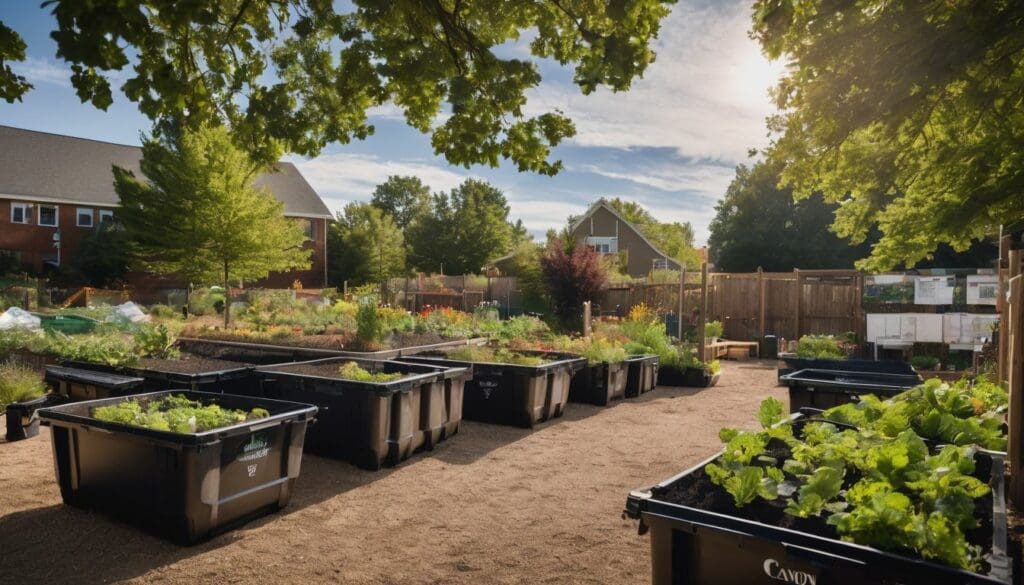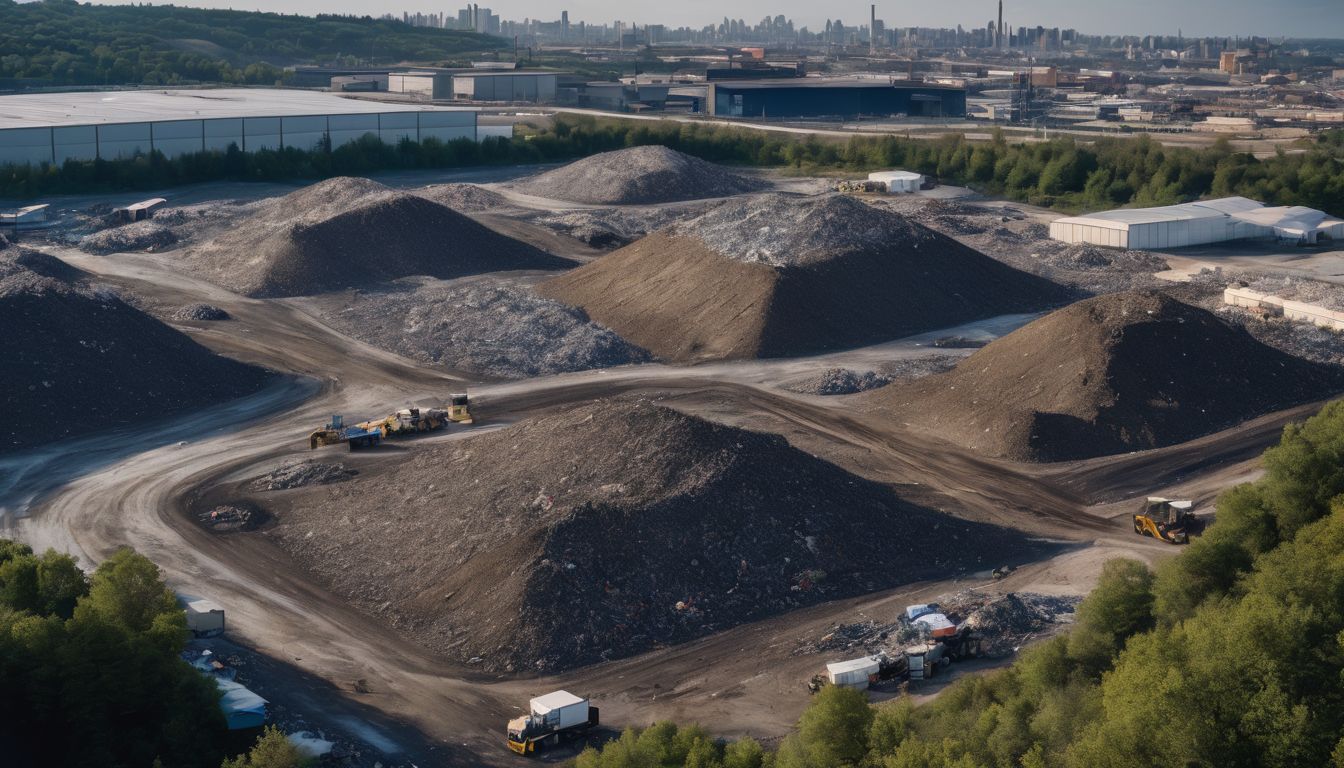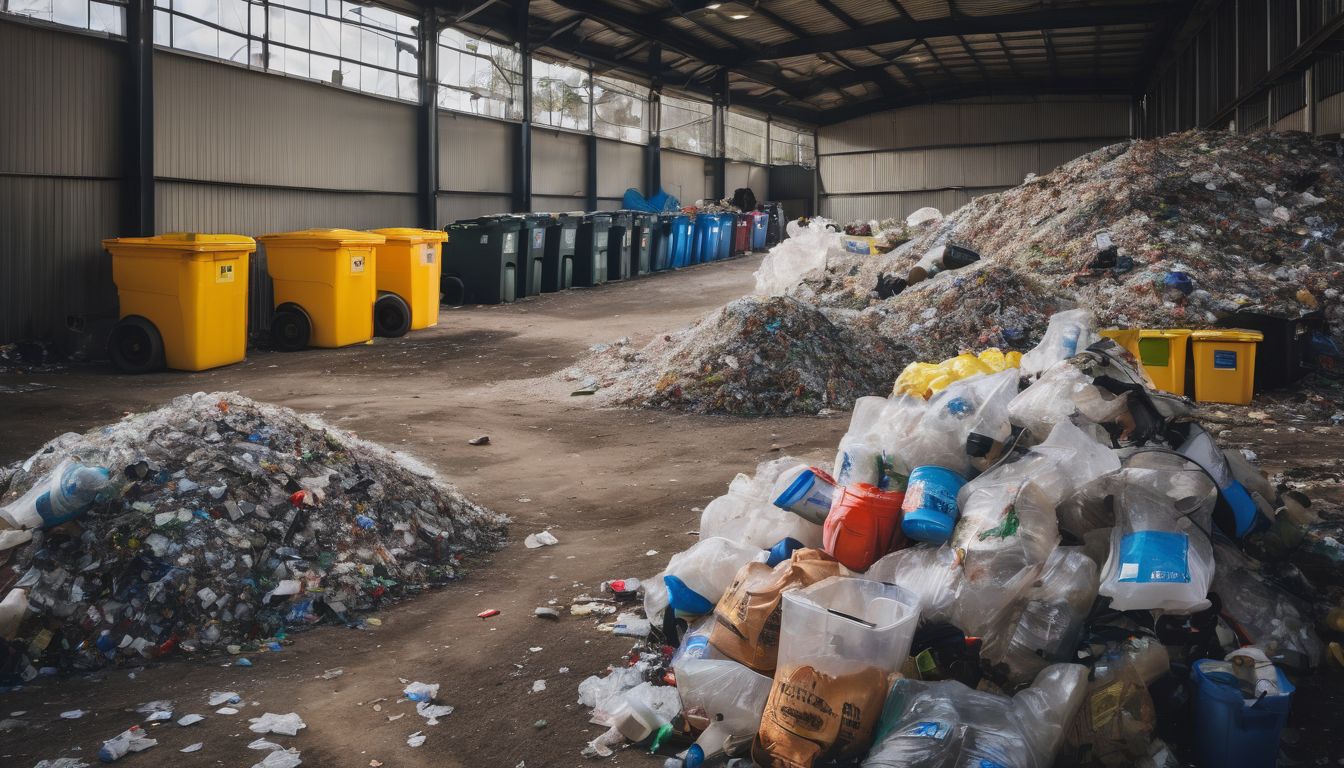Tackling waste is a challenge we all face in our daily lives. Did you know that cities like San Francisco are leading the charge towards zero waste, diverting 80% of their refuse from landfills? This blog will guide you through inspiring examples and practical steps your community can take to reduce its footprint.
Join us on this green journey!
Key Takeaways
- Cities like San Francisco aim for zero waste by adopting comprehensive strategies such as mandatory composting and banning plastic bags, achieving an 80% landfill diversion rate.
- The U.S. Conference of Mayors and Zero Waste International Alliance guide cities across the United States towards sustainable living by promoting recycling, edible food capture, and product stewardship initiatives.
- Austin, Texas is working towards a zero – waste goal by 2040 with actions like kerbside composting and construction material reuse programmes, highlighting widespread commitment to sustainability in various regions.
- Connecticut’s state government targets a 60% waste diversion from landfills by 2024 through single-stream recycling programmes and its “RecycleCT” initiative which encourages effective recycling practices among residents.
- Zero waste communities incorporate circular economy principles to extend the life cycle of products through repair, reuse, and efficient resource management while fostering responsible consumer behaviour advocating for environmental conservation.
The Definition of Zero Waste
Zero Waste is a philosophy and a goal to eliminate waste and reduce the use of resources. It focuses on redesigning products, processes, and systems to prevent any material from being sent to landfills or incinerators.
Zero Waste International Alliance
The Zero Waste International Alliance (ZWIA) spearheads the global movement towards waste minimisation. By setting stringent standards, ZWIA helps communities and businesses steer clear of landfills and incinerators.
Their definition of zero waste means designing products and processes to completely avoid rubbish, not just manage it.
Leaders in sustainable living look to ZWIA for guidance on resource conservation and implementing effective recycling initiatives. This alliance plays a key role in educating stakeholders about circular economy principles that enhance zero waste efforts.
With their expertise, cities are transforming into eco-friendly communities where nothing is wasted, supporting environmental sustainability at its core.
U.S. Conference of Mayors
The UK Conference of Mayors actively promotes waste reduction strategies in cities across the nation. Municipal leaders collaborate to develop sustainable and resilient future communities through waste management solutions and resource maximisation efforts.
The conference plays a crucial role in driving ecofriendly practices, supporting zero waste initiatives, and fostering green infrastructure development at the local level.
Cities involved in the UK Conference of Mayors are dedicated to implementing product stewardship initiatives, promoting edible food capture, and contributing to bulky material reuse.
Seattle Public Utilities
Seattle Public Utilities plays a vital role in promoting sustainable communities through its zero waste initiatives. The utility actively supports edible food distribution and bulky material recycling, contributing to the creation of eco-friendly societies.
By focusing on reducing and reusing materials, Seattle Public Utilities is setting an example for other communities to follow in their quest for zero waste.
The involvement of Seattle Public Utilities in product stewardship initiatives underlines its commitment to achieving zero waste. Through these efforts, the utility ensures that environmentally conscious individuals have access to essential resources while simultaneously supporting conservation and environmental sustainability.
Solid Waste Association of North America
The Solid Waste Association of North America (SWANA) plays a vital role in supporting zero waste initiatives. SWANA provides resources and guidance to local governments, businesses, and individuals on sustainable waste management practices.
Through education, training programmes, and industry events, SWANA helps communities implement effective strategies for reducing waste generation and increasing recycling rates.
By collaborating with industry professionals and advocating for sustainable policies, the Solid Waste Association of North America empowers communities to move towards zero waste goals.
Their efforts contribute significantly to the development of eco-friendly societies dedicated to environmental conservation.
State of Connecticut
Connecticut has made significant strides towards achieving zero waste, with the state government aiming to reduce waste generation and diverting 60% of solid waste from landfills by 2024.
The Connecticut Department of Energy and Environmental Protection (DEEP) launched a statewide initiative promoting “RecycleCT,” which encourages recycling and provides resources for sustainable waste management.
Multiple municipalities in Connecticut have implemented single-stream recycling programmes, making it easier for residents to recycle various materials without sorting them. Additionally, the state’s Bottle Bill has increased the recycling rate for beverage containers, contributing to Connecticut’s progress towards zero waste.
Moving forward, it is essential for communities in Connecticut to continue fostering partnerships between local governments, businesses, and residents to achieve zero waste goals effectively.
By expanding composting efforts and investing in infrastructure that supports eco-friendly practices such as product stewardship initiatives and reducing material consumption through education campaigns will be crucial steps towards realising a future of zero waste in the state.
Examples of Successful Zero Waste Communities
– San Francisco, California has been a leader in the zero waste movement, with an ambitious goal to achieve zero waste by 2020. Alameda, California has also made significant strides towards zero waste, implementing programmes such as food scrap collection and composting.
King County, Washington has achieved a 70% recycling rate through their comprehensive waste reduction and recycling programmes. Middletown, Connecticut is another example of a successful zero waste community with its innovative single-stream recycling programme.
Austin, Texas has set a goal to reach zero waste by 2040 and has implemented programmes such as curbside composting and construction material reuse initiatives. Asheville, North Carolina is known for its strong commitment to sustainability and has made progress in diverting organic materials from landfills through their residential food scraps collection programme.
The Central Vermont Solid Waste Management District is an example of a successful regional collaboration that focuses on reducing waste through education and outreach efforts.
https://www.youtube.com/watch?v=rRcgywCg4ME
San Francisco, California
San Francisco, California has been a trailblazer in the zero waste movement, achieving an impressive 80% landfill diversion rate. The city’s comprehensive approach focuses on reducing waste generation through source reduction and reuse before recycling or composting.
By implementing policies such as mandatory composting and a plastic bag ban, San Francisco has significantly reduced its environmental impact while setting an example for other communities aiming to become more eco-friendly.
San Francisco’s commitment to zero waste extends beyond individual actions to include community-wide initiatives like public education campaigns and partnerships with local businesses.
Alameda, California
Alameda, California has made significant strides in creating a zero waste community. The city has implemented various programmes to reduce waste and increase recycling rates. By encouraging residents to compost food scraps and yard trimmings, Alameda has successfully diverted a substantial amount of organic waste from landfills.
Additionally, the city provides comprehensive education on proper recycling practices, ensuring that materials are sorted correctly and effectively recycled. Through these initiatives, Alameda aims to create an eco-friendly environment where waste is minimised and resources are conserved.
As part of their sustainability efforts, Alameda’s focus on reducing single-use plastics and promoting reusable alternatives aligns with the principles of zero waste communities. Their commitment to sustainable practices not only benefits the local environment but also sets an example for other communities striving for eco-friendly living.
Moving forward, it will be important for Alameda to continue expanding their initiatives in order to achieve even greater reductions in waste production and increased resource recovery within the community.
King County, Washington
King County, Washington has made significant strides in establishing itself as an eco-friendly community. Through innovative waste reduction programmes and initiatives, King County is actively working towards a zero waste society.
The county’s commitment to reducing, reusing, and recycling materials sets a prime example for other communities aiming to achieve environmental sustainability.
With a focus on edible food capture and distribution, bulky material recycling, and product stewardship initiatives, King County is embracing the principles of circular economy while promoting conservation efforts.
Middletown, Connecticut
Middletown, Connecticut has emerged as a leader in the zero waste movement, implementing innovative strategies to reduce waste and promote sustainability. The city has prioritised initiatives like edible food capture and distribution, bulky material recycling, and product stewardship to minimise its environmental impact.
By embracing these eco-friendly practices, Middletown is setting an example for other communities striving to achieve zero waste status.
In Middletown, the concept of circular economy is being embraced through reducing and reusing materials which are critical to achieving zero waste objectives. This approach not only minimises landfill contributions but also promotes resource efficiency while generating economic opportunities within the community.
Austin, Texas
Transitioning from the successful zero waste initiatives in Middletown, Connecticut, we look to Austin, Texas. This vibrant city is committed to becoming a zero-waste community through various measures.
From recycling and composting programmes to promoting sustainable practices throughout the city, Austin is making strides towards eco-friendly living.
The local government has implemented policies and incentives aimed at reducing waste generation while encouraging responsible disposal. Residents are actively engaging in recycling efforts and supporting local businesses that prioritise sustainability.
Asheville, North Carolina
Asheville, North Carolina is making significant strides towards becoming a zero waste community. The city has set ambitious goals to reduce landfill disposal and increase recycling rates.
Its initiatives include expanding the kerbside composting program, supporting local businesses in reducing packaging waste, and promoting community education on sustainable practices.
Additionally, Asheville has implemented a ban on single-use plastic bags to minimise environmental impact and encourage the use of reusable alternatives.
Furthermore, Asheville’s commitment to sustainability extends to its events and festivals, where organisers prioritise eco-friendly practices such as composting food scraps and using biodegradable servingware.
Central Vermont Solid Waste Management District
The Central Vermont Solid Waste Management District leads the charge in promoting sustainable waste management practices. By offering comprehensive recycling programmes and collection services for hazardous waste, they are actively reducing the environmental impact of their communities.
Through collaborative efforts with local businesses and residents, the district educates on best practices to minimise waste generation and promote a circular economy mindset.
Moreover, the Central Vermont Solid Waste Management District consistently seeks innovative solutions to further reduce landfill-bound materials. By advocating for product stewardship initiatives and encouraging material reuse, they continue to set an example for eco-friendly communities striving towards zero waste goals.
The Role of Circular Economy in Zero Waste
Zero waste implements circular economy concepts to reduce and eventually eliminate waste, promoting the reuse, repair, and recycling of materials to create a more sustainable future.
Read on to discover how circular economies play a crucial role in achieving zero waste communities.
How zero waste implements circular economy concepts
Zero waste implements circular economy concepts by promoting the reuse, repair, and recycling of materials to minimize waste generation. This approach aims to keep products and materials in use for as long as possible through sustainable practices.
By adopting a circular economy model, zero waste communities prioritize designing products that can be easily disassembled and recycled while reducing the dependence on single-use items.
Implementing circular economy concepts into zero waste initiatives encourages environmentally friendly production processes and supports local economies. It also promotes innovation in resource management, ultimately contributing to the conservation of natural resources and reduction of environmental impact.
How zero waste can be improved by circular economies
Implementing circular economies can enhance zero waste initiatives by promoting the reuse and recycling of materials, reducing overall waste production. Circular economy principles encourage a shift towards sustainable resource management, offering opportunities for communities to create closed-loop systems that minimise environmental impact while maximising resource efficiency.
By integrating circular economy concepts into zero waste strategies, communities can work towards reducing their carbon footprint and moving closer to achieving their sustainability goals.
Transitioning from how zero waste implements circular economy concepts, considering the improvement of zero waste through circular economies is crucial for creating environmentally friendly communities.
The future of zero waste
Zero waste communities are paving the way for a more sustainable future. As technology and innovation continue to advance, the future of zero waste looks promising. Circular economy concepts will play a significant role in redefining how we manage resources, and product stewardship initiatives will enhance our ability to reduce, reuse, and recycle materials.
The development of eco-friendly communities through edible food capture and distribution projects is also set to make a positive impact on achieving zero waste goals.
As we look ahead, it’s evident that more environmentally conscious individuals will join forces to support conservation efforts. With the growing interest in creating eco-friendly communities, the future of zero waste is bright.
Steps to Achieve Zero Waste in Communities
Implementing edible food capture and distribution programmes, promoting bulky material recycling, initiating product stewardship initiatives, and emphasising the reduction and reuse of materials are crucial steps in achieving zero waste in communities.
These strategies encourage sustainable practices and contribute to the overall goal of reducing environmental impact.
Edible food capture and distribution
Communities can achieve zero waste by implementing edible food capture and distribution programmes. Surplus edible food from retailers, restaurants, and other sources is rescued and redistributed to those in need rather than being discarded.
Such initiatives not only reduce the amount of organic waste entering landfills but also provide fresh, nutritious options for individuals facing food insecurity. By supporting these programmes, environmentally conscious individuals actively participate in creating eco-friendly communities while promoting conservation efforts.
When surplus edible food is captured and distributed within communities, it significantly reduces wastage while contributing to sustainable living. This approach aligns with the principles of a circular economy by ensuring that resources are utilised efficiently and responsibly.
Bulky material recycling
After capturing and distributing edible food, another crucial aspect of achieving zero waste in communities is bulky material recycling. Bulky waste includes items such as furniture, appliances, mattresses, and electronics.
Communities can set up special pick-up services or designated drop-off locations for these large and often challenging-to-dispose-of items. Recycling bulky materials helps to divert them from landfills and reduce the environmental impact associated with their disposal.
By taking part in this initiative, eco-friendly communities contribute significantly to conservation efforts while bolstering their commitment to environmental sustainability.
Moreover, promoting awareness about proper disposal methods for bulky materials among residents plays a key role in ensuring the success of these recycling programmes. It encourages responsible consumer behaviour by encouraging individuals to carefully consider the end-of-life options for their possessions before simply discarding them.
Product stewardship initiatives
When communities focus on bulky material recycling, they also prioritise product stewardship initiatives to reduce environmental impact. Product stewardship involves actively managing the ecological and social impacts of products throughout their lifecycle.
This approach encourages manufacturers, retailers, and consumers to share responsibility for reducing waste and minimising the environmental effects of products.
Product stewardship initiatives work towards sustainable practices from conception through disposal. It extends beyond recycling efforts by promoting eco-friendly design, efficient resource use, environmentally responsible manufacturing processes, and safe end-of-life disposal.
Reducing and reusing materials
Communities can reduce waste by using materials efficiently. One way is to minimise packaging and single-use items. Reusing containers, bags, and products also reduces waste significantly.
Choosing durable goods and repairing items instead of disposing of them helps cut down on waste.
Another approach involves creating a culture of borrowing, swapping, or donating goods rather than buying new ones. This shift towards a circular economy empowers communities to make the most out of existing resources, reducing the need for excessive production and consumption.
Conclusion
In the future, communities will embrace zero waste as a way of life. They will prioritise reusing and recycling to minimise waste. Circular economy principles will drive innovation and sustainable practices.
Zero waste communities are the path to a cleaner, healthier planet for all.
FAQs
1. What are zero waste communities?
Zero waste communities are places where people work together to reduce the rubbish they create, aiming to reuse and recycle everything and send nothing to landfill.
2. Why are ecofriendly communities important for the future?
Ecofriendly communities help protect our planet by reducing pollution and conserving natural resources, making sure we have a healthy environment for years to come.
3. How can I be part of a zero waste community?
Join in by using less plastic, recycling what you can, composting food scraps, and choosing products that don’t have a lot of packaging whenever possible.
4. What changes will we see in zero waste communities in the future?
In the future, expect more innovative ways to manage waste as these communities strive towards using resources wisely and keeping their neighbourhoods clean and green.





